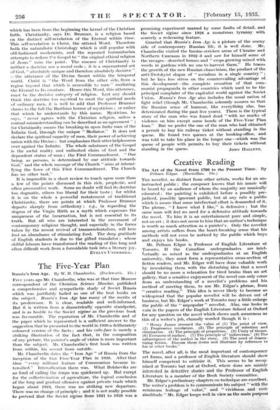The Five-Year Plan
Russia's Iron Age. By W. H. Chamberlin. (Duckworth. 153.) FIVE years ago Mr. Chamberlin, who was at that time Moscow correspondent of the Christian Science Monitor, published a comprehensive and sympathetic study of Soviet Russia which was justifiably hailed as one of the best books on the subject. Russia's Iron Age has many of the merits of its predecessor. It is clear, readable and well-informed. But it is written from a diametrically opposite standpoint, and is as hostile to the Soviet regime as the previous book was favourable. The reputation of Mr. Chamberlin and of the paper which he represented is a sufficient answer to the suggestion that he presented to the world in 1930 a deliberately- coloured version of the facts ; and his voile-face is merely a striking illustration of the fact that, in the composition of any picture, the painter's angle of vision is more important than the subject. Mr. Chamberlin's first book was written from within, his second from outside.
Mr. Chamberlin dates the "Iron Age" of Russia from the inception of the first Five-Year Plan in 1928. After that time "every militant feature of Communism became in- tensified." Intensification there was. What Bolsheviks are' so fond of calling the tempo was quickened up. But except for the collectivization of agriculture, the logical conclusion of the long and gradual offensive against private trade which began about 1924, there was no striking new departure. There was no change of principle ; and it is not really possible to pretend that the Soviet regime from 1921 to 1928 was a promising experiment marred by some faults of detail, and the Soviet regime since 1928 a monstrous tyranny with scarcely a redeeming feature.
Granted that Russia's Iron Age is a picture of the seamy side of contemporary Russian life, it is well done. Mr. Chamberlin visited the famine-stricken areas of Ukraine and Northern Caucasus in 1932-3 and saw for himself some of the ravages—deserted houses and crops growing mixed with, weeds in gardens with no one to harvest them." He traces the growth of the new Russian chauvinism, the product of the anti-Trotskyist slogan of "socialism in a single country " ; but he lays less stress on the .countervailing advantage of. this development—the .complete cessation of that corn.. monist propaganda, in other countries which used to be the principal complaint of the capitalist world against the Soviet Union. Russia's Iron Age also includes the usual ration of light relief (though Mr. Chamberlin solemnly assures us that the Russian sense of humour, like everything else, has deteriorated during the past five years). There is the typical story of the man who was found dead "with no marks of violence on him except some bonds of the Five-Year Plan. loan." But we prefer the one of the man who had obtained " a permit to buy his railway ticket without standing in the queue. He found two queues at the booking-office, and was told to take his place in the longer one—which was the queue of people with permits to buy their tickets without










































 Previous page
Previous page